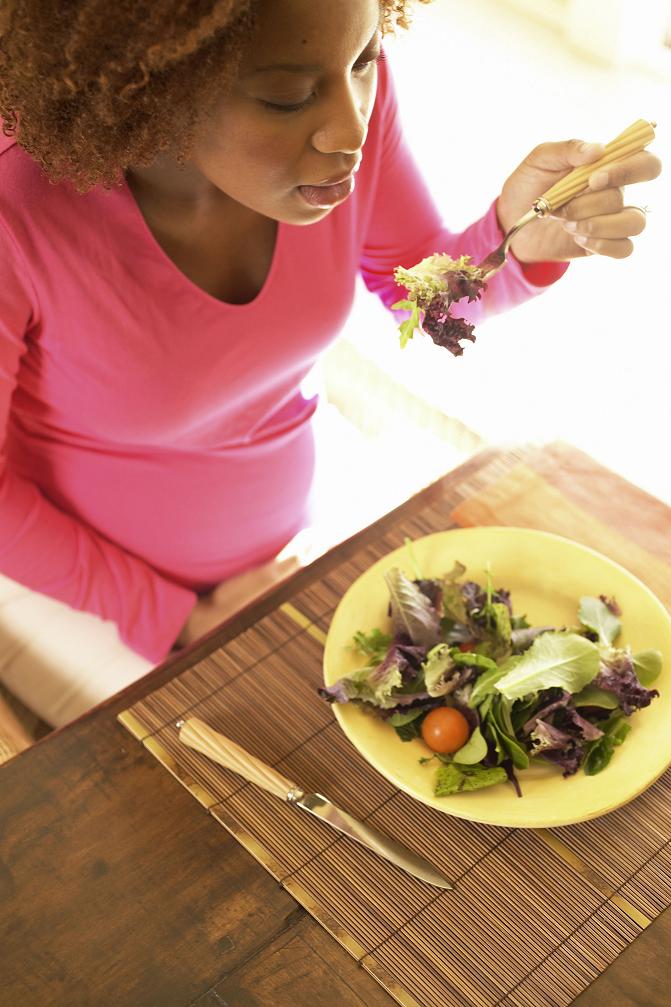 By Amy Paturel
By Amy PaturelIt may be tempting to trash your healthy eating habits during pregnancy. After all, you're going to get big no matter what you eat, right? Not so fast. Experts say that making nutrition mistakes during pregnancy not only robs your baby of crucial nutrients, it also sabotages your own short- and long-term health. Make pregnancy an opportunity to improve your health, says registered physician assistant Amy Hendel, author of 2008's Fat Families, Thin Families. Take care of yourself before pregnancy, or improve your eating habits as soon as you know you are pregnant.
Start by avoiding these top 10 prenatal nutrition mistakes.
1) Not eating enough whole foods in their natural state. Hendel recommends eating fewer packaged, processed foods and more whole foods that are natural sources of essential nutrients, such as 100 percent orange juice: It provides folate, vitamin C and potassium.
2) Eating unsafe foods. Raw fish (that means sushi) is better left alone during pregnancy, as it may contain pathogens that could harm your growing baby. So are mercury-laden swordfish, mackerel, tilefish and albacore tuna. Also avoid unpasteurized soft cheeses as well as deli meats, unless you heat them until steaming before eating.
3) Skipping breakfast. Bodily processes continue during sleep, so by the time you wake up, your nutrient stores are low and need to be replenished, Hendel says. She recommends eating a breakfast containing lean protein, whole-grain carbohydrates, healthy fats, dairy and fruit. A good example: A whole-grain English muffin with 2 teaspoons of nut butter, a banana and a glass of nonfat milk.
4) Eating for two. During pregnancy, the need for some nutrients doubles, but calorie needs increase very little. Actually eating for two means extra weight gain, which can lead to gestational diabetes, a large baby and a difficult delivery, not to mention having to get rid of all that extra weight, says Bridget Swinney, M.S., R.D., author of 2006's Eating Expectantly. Most women need a max of only 300 extra calories a day during the second and third trimesters; some need less and very few need more, she says. That translates to less food than you may think, so make it count: an ounce of almonds, ¼ cup dried apricots and a piece of string cheese.
5) Overly restricting calories. Dieting may deprive both you and your baby of important nutrients, saysHendel. If you gain a healthy 25 to 35 pounds during pregnancy, your body should naturally lose that weight after delivery. If you are under- or overweight at the start of pregnancy, you may need to gain more or less. Consult your doctor for guidelines.
6) Getting too much caffeine. Caffeine can cross the placenta and is difficult for the fetus to metabolize, says Melinda Johnson, R.D., a Phoenix-based spokeswoman for the American Dietetic Association. At least one study, from Kaiser Permanente, linked heavy caffeine consumption with miscarriage; however, another by the National Institutes of Health found no association between intakes of up to 350 mg a day and miscarriage. Moderate amounts of caffeine (less than 250-300 mg a day, or about two 8-ounce cups) shouldn't be a problem, says Swinney. Caffeine also lurks in sodas and tea.
7) Eating only three squares a day. Smart snacking can alleviate many pregnancy problems, such as nausea, heartburn and cravings, says Swinney. Plus, eating healthy snacks between meals can make it easier to get the nutrient-dense foods you need. She recommends fruit, vegetables, yogurt, whole-grain crackers, low-fat cheese, nuts and sunflower seeds. A more constant flow of calories in proper portions also helps keep blood sugar levels in check, particularly important for women with gestational diabetes.
8) Relying too much on prenatal vitamins. Even if you take your prenatals religiously, you still need to eat right. We can't extract all the good things from fish or produce and put them into a pill, says Megan Tubman, M.S., R.D., owner of Fresh Start Nutrition Studio in New York. A prenatal vitamin definitely helps, but many nutrients, especially phytochemicals (such as lycopene in tomatoes and anthocyanins in blueberries) are only found in food.
9) Satisfying cravings with the wrong foods. Instead of loading up on empty calories (such as sugary sodas, processed snacks and sweets), choose the most nutrient-rich sources to satisfy your cravings, says Melinda Johnson. Hankering for ice cream? Have a bowl of frozen yogurt. Want a slice of greasy, cheesy pizza? Try a few whole-grain crackers with low-fat cheddar cheese. When only the real thing will do, indulge your cravings occasionally with proper portion sizes.
10) Going into weight-gain denial. Monitoring your weight will help you know if you're eating the right amount, Tubman says. If you gain too much, you can modify your food intake or activity level to get back on track.
Tags
Health and well-being Pregnancy Nutrition